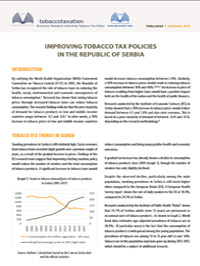
- Impacts of Tobacco Taxation on Poverty and Inequality in Serbia (2023)
- Impacts of Tobacco Tax Increases on Tax Revenues and Public Health in Serbia: A Simulation Model (2023)
- Macroeconomic Impacts of Tobacco Taxation in Serbia (2022)
- Distributional Impact of Tobacco ExciseTaxes in Serbia (2022)
- Crowding out Effect of Tobacco Consumption in Serbia (2021)
- Tobacco Tax Avoidance and Evasion in Serbia (2021)
- Adult Tobacco Consumption in Serbia, 2019 (2020)
- Tobacco Elasticities and Government - Serbia (2019)
- National Study on Economic of Tobacco and Tobacco Taxation (2018)
- Policy briefs
- Increasing Tobacco Taxation Reduces Inequality with Insignificant Impact on Poverty (2023)
- The net impact of higher tobacco taxation on output, income, and employment is positive (2022)
- Increasing Tobacco Taxes Benefits Low-Income Households The Most (2022)
- The Burden of Tobacco Spending on Households in Serbia
- Tobacco Tax Avoidance and Evasion in Serbia (2021)
- Survey on Tobacco Consumption in See Countries - Fact Sheet Serbia 2019 (2020)
- Evidence-Based Tobacco Taxation Policy in Serbia - Some Recommendations for Policy Makers (2019)
- Improving Tobacco Tax Policies in the Republic of Serbia (2018)
Improving Tobacco Tax Policies in the Republic of Serbia (2018)
Improving Tobacco Tax Policies in the Republic of Serbia 
By ratifying the World Health Organization (WHO) Framework Convention on Tobacco Control (FCTC) in 2005, the Republic of Serbia has recognized the role of tobacco taxes in reducing the health, social, environmental and economic consequences of tobacco consumption.1 Research has shown that raising tobacco prices through increased tobacco taxes can reduce tobacco consumption.
The research fndings indicate that the price elasticity of demand for tobacco products in low and middle-income countries ranges between -0.2 and -0.8.2 In other words, a 10% increase in tobacco prices in low and middle-income countries would decrease tobacco consumption between 2-8%. Similarly, a 50% increase in tobacco prices would result in reducing tobacco consumption between 10% and 40%. tobacco resulting from higher taxes would have a positive impact both on the health of the nation and the health of public fnances.
Research conducted by the Institute of Economic Sciences (IES) in Serbia showed that a 10% increase in tobacco prices would reduce demand between 4.5 and 7.6% and also raise revenues. This is based on a price elasticity of demand of between -0.45 and -0.76, depending on the research methodology.
Improving Tobacco Tax Policies in the Republic of Serbia -download here

